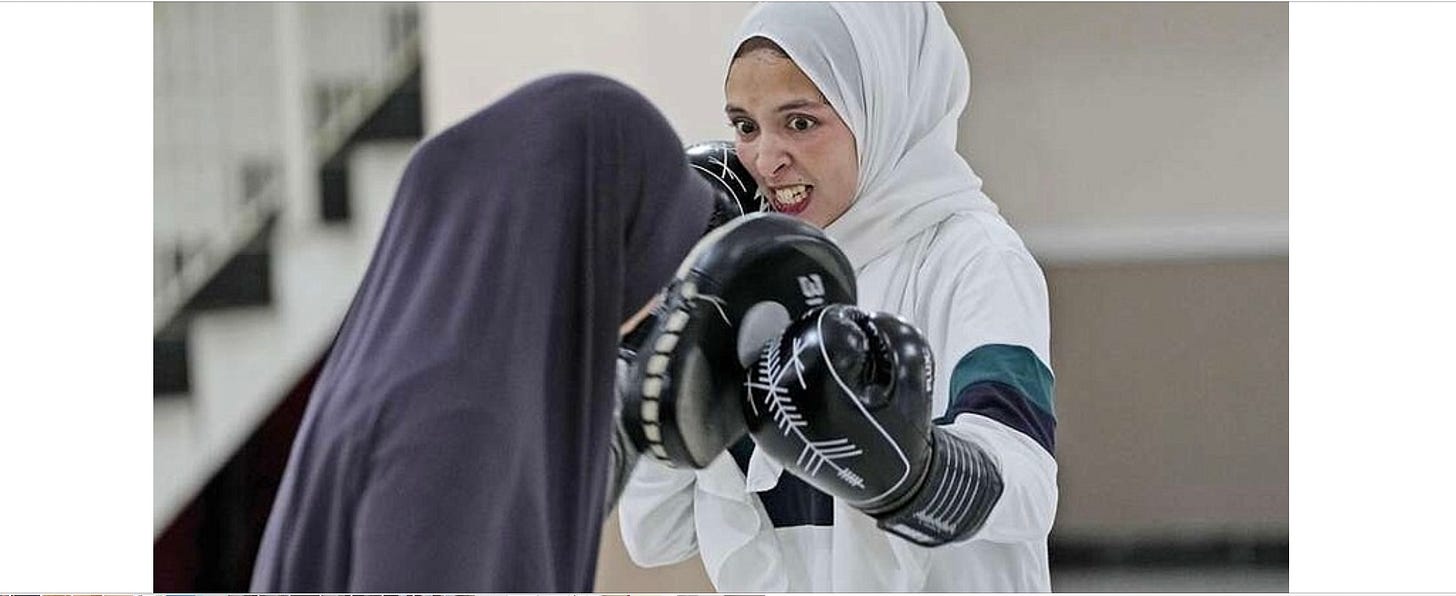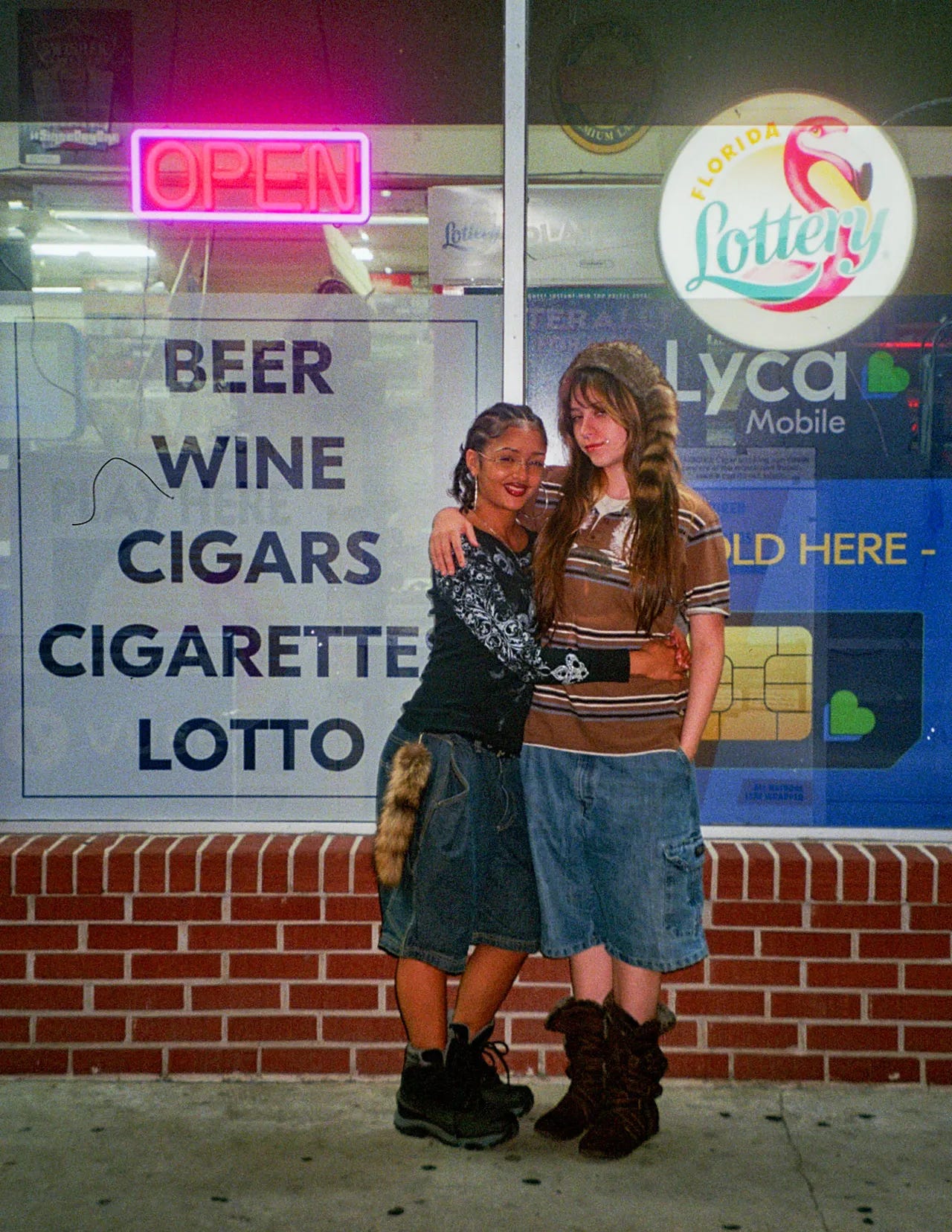Global Roundup: Indonesia Women in Martial Arts, Kenya 'Peasant Feminists’, Ghana LGBTQ+ Community, Bolivia Indigenous Journalist, Queer Life in the US South & Midwest
Curated by FG Contributor Samiha Hossain
Fera Shahab (right) trains with self-defense coach Rahimatul Hasanah on July 3 during during a private class in Jakarta, Indonesia. (AP/Achmad Ibrahim)
Women in Indonesia are asserting themselves with martial arts as gender-based violence remains a challenge. An emotionally and physically abusive marriage of 11 years led Rani Miranti, 38, to join a fight club that has trained her in martial arts, enabling her to stand up against violence.
Government protection usually comes after violence has happened, while we never know when it will come. Unfortunately, when it suddenly comes, no one can help. So, we need to have self-defense capabilities. -Rani Miranti
The National Commission on Violence Against Women, known as Komnas Perempuan, recorded 289,111 cases last year, a decrease of around 12% from 339,782 in 2022, the year when a law on sexual violence was enacted. However, a large number of cases went unreported because of several factors: limited access for victims to complaint services, a weak case documentation system and a high level of social stigma toward victims of violence. Indonesia's Parliament approved a far-reaching law in 2022 that sets punishment for sexual violence and guarantees provisions, restitution or other remedies for victims and survivors.
This month, Indonesia's electoral commission fired its chair after finding him guilty of sexual assault following a complaint by an employee. It was the latest in a series of the country's high-profile cases of violence against women. With cases growing, more Indonesian women and girls who feared physical violence turned to alternative ways of ensuring their safety, including self-defense classes and clubs.
For Miranti, whose husband repeatedly attacked and physically abused her, Muay Thai is the most suitable self-defense, as it helps her gain more skills, self-confidence and prevention techniques. She enrolled in a course almost two years ago after she decided to get out of her abusive marriage in 2018. Miranti's woman coach, Rahimatul Hasanah, said she was overwhelmed by the increasing demand of women who want to learn martial arts, especially in private training, as female Muay Thai instructors are hard to find.
Learning physical self-defense not only gives the tools to control their reactions to negative situations, but also can build the confidence for mental defense too. -Rahimatul Hasanah
A Kenyan Peasants League Women’s Collective demonstration in 2022. Image: Kenyan Peasants League
Kenyan women possess only 81% of the legal rights afforded to men. A mere 1% of the women involved in small-scale agriculture hold their land in their own names. Access to finance, food, and water hinges on land ownership, leaving many women at a severe disadvantage. Susan Owiti, the Secretary General of the Kenyan Peasants League Women’s Collective, is unwavering in her mission.
The patriarchal system is oppressing women. Land is a feminist issue. -Susan Owiti
Founded in 2018, the Kenyan Peasants League Women’s Collective champions peasantry, agroecology, and organic farming to achieve food sovereignty, as well as resisting women’s oppression and exploitation. The Collective promotes the use of indigenous seeds, rainwater irrigation, and composting with animal waste, among other organic farming practices. Women exchange indigenous seeds at a community seed bank at the Women’s Collective headquarters in Nairobi. However, multinational agricultural companies target rural women, selling them pesticides, fertilizers, and non-indigenous seeds. Land grabs — illegal land seizures — are also rampant.
[The women are] lured into signing micro-credit loans with their land as collateral. Most of these women are illiterate. Most affected are widows When their husbands die, in-laws grab their land. These peasant women lack legal knowledge, so we guide them through the laws that protect their rights. -Susan Owiti
Although legal battles are expensive, the Collective persists. They use table banking, solidarity funds, and crowdfunding for legal fees, low-interest loans, and a rescue center. Mildred Nduta, the Assistant General for the Women’s Collective, notes that most of the women they help face physical, emotional, and economic violence. Beyond providing a safe haven, the collective runs a girls’ empowerment program, offering Sexual and Reproductive Health and Rights (SRHR) education. They provide knowledge, sanitary pads, and condoms to protect against HIV and early pregnancy.
Getty Images
In February, Ghana’s parliament passed the bill to increase existing criminal penalties for queer people living in the country. Although not yet law, it seeks to impose prison sentences for those identifying as part of the queer community as well as those who “support” LGBTQ+ activities. Prominent activist groups have urged president Nana Akufo-Addo to refuse to sign it into law. LGBTQ+ Ghanaians already face high levels of discrimination and violence.
August – not their real name – told PinkNews it’s been a “very challenging time”. They’re known as a leader in the community and often get people who are “scared” asking them what resources are available to help.
It’s very important for the community to know how to take care of ourselves in times of difficulty. We do not know who to trust. We are just like a ball floating on a very big water surface. We do not know where we go next. At the end of the day, we just wake up hoping that it doesn’t happen the way the wider society is expecting it to happen. -August
Debates over the bill, which was first proposed in 2021, and LGBTQ+ rights have increased in recent months. So too, have the attacks on members of the queer community. The current political climate has LGBTQ+ people feeling that they should seek asylum in safer countries, but most of them “don’t have the next step”, August said, adding that it is not an easy process for Ghanians. For August, however, their love of their fellow countrymen and the community-led initiative they’ve established has kept them rooted in Ghana.
Even though my family’s homophobic, that love for them still exists. The fact I’ve established something here, I don’t want to leave it and go. I love the Ghanaian community, regardless of how homophobic [they are] or the fact they use [anti-LGBTQ+ talking points] in their speeches. -August
Still photo from Yolanda Mamani’s YouTube show “Chola Bocona.”
After moving from her rural community in the Bolivian Andes to the capital city of La Paz, Mamani started out as a domestic worker. Faced with racism, she helped launch a radio program by and for domestic workers. The radio show was created out of the domestic workers’ union in collaboration with the Bolivian feminist organization Mujeres Creando and their popular broadcast Radio Deseo. It serves as an organizing platform to denounce abusive employers, defend rights, and discuss the realities faced by workers, especially women in precarious and informal sectors. This led to Mamani’s own YouTube Channel called Chola Bocona, where she shares her views on racism, politics, and capitalism from her standpoint as an Indigenous woman in Bolivia today.
In an interview with NACLA, Mamani discusses her childhood and how her parents wanted her to learn Spanish, while not forgetting about Aymara.
In my community I was just another kid enjoying running in the hills, singing, and hearing the echo of my voice in the mountains. That’s who I was: I was myself. When I arrived in the city, all that changed. That’s why I say I became a chola in the city, I became “imilla bocona” (big-mouthed girl), and I’m proud. -Yolanda Mamani
The 25 domestic workers on the radio show were able to learn about operating radio controls and the computer, as well as receive training in writing, basic research techniques, control operation and editing software. They wanted the quality of the work they produce to be high quality. More importantly, they didn’t want to reproduce how mainstream media victimizes and criminalizes domestic workers. The program allowed them to meet other women like sweepers, sellers, women bricklayers, women construction workers, and other sectors that are also exploited and discriminated against. An 18 year old was fired from her job as a domestic worker after speaking out on the radio show. It led them to create a coop called Sin Patrón ni Patrona (Without Bosses), where they offer pet sitting services, cleaning, food delivery and laundry – things the fired women were skilled in.
Mamani also shares how she started her YouTube program Chola Bocona.
It was important for me that cholas were also in those spaces. Let’s stop thinking that the chola needs to be stuck in the past, so that she ends up being a relic from a museum. That’s not what a chola is; a chola is a living character, and you don’t need to go to the museum to see her. She is adapting to this global world; we don’t lack anything. -Yolanda Mamani
Ultimately, Mamani wanted to advocate for herself and others like her. She believes in the power of women sharing their stories and “speaking in the first person”.
Photo; Carmen DeCristo
Photographer Carmen DeCristo, 24, has been roadtripping to rural areas in the South and the Midwest over the past year and has documented her travels through her zine American Girl Doll, its name a trans-themed pun on the name of the popular children’s toy line. The images are an intimate portrayal of the DIY queer scenes DeCristo has encountered — from raves held in churches to soirées in smoke shops — and of the photographer’s own relationship to the concept of American girlhood.
The project began with a volume that DeCristo printed and assembled by hand. To her surprise, the zine sold out within two hours of her posting about it on social media. For the three subsequent volumes, she found a printing press, and has been intermittently road tripping across America since then, selling the zines for gas money to get to her next destination. Them interviewed DeCristo.
When I conceptualized this project, it was originally a trilogy, and each one had a different girl on the cover. And each volume delves into a different slice of my story as a trans woman, as an “American Girl Doll.” -Carmen DeCristo
DeCristo grew up in Silk Hope, North Carolina, a very small town. It was important for her to highlight cities in the South and the Midwest because the politics are not in favor of trans people right now, she says. People are now organizing in ways she felt that she could not while growing up in the South.
DeCristo is still on the road, trying to get the zine across the country as far as possible. She believes she has sold over 200 copies in at least 15 states so far. She speaks about how the project has given her a purpose in life to document her community and get the work out there as much as possible.
Thank you for reading Global Roundup. You can support FEMINIST GIANT by:
Hitting the heart button so that others can be intrigued and read
Upgrading to a paid subscription to help keep FEMINIST GIANT free
Opting for a one-time payment via buying me a coffee
Sharing this post by email or on social media
Samiha Hossain (she/her) is an aspiring urban planner studying at Toronto Metropolitan University. Throughout the years, she has worked in nonprofits with survivors of sexual violence and youth. Samiha firmly believes in the power of connecting with people and listening to their stories to create solidarity and heal as a community. She loves learning about the diverse forms of feminist resistance around the world.






